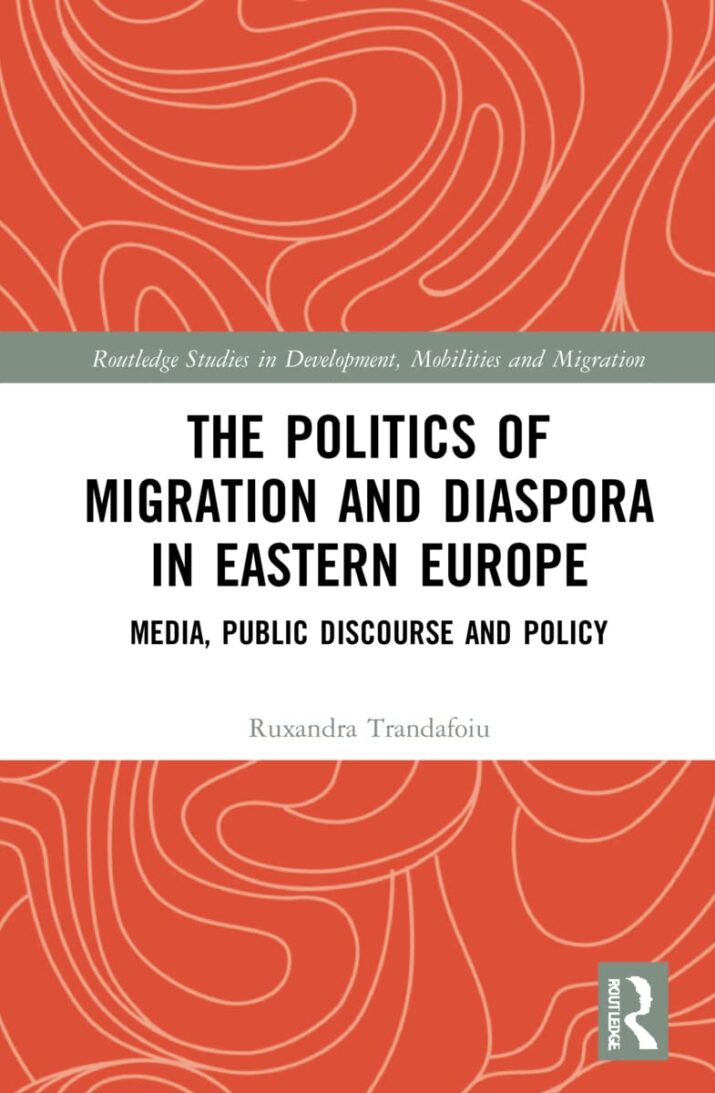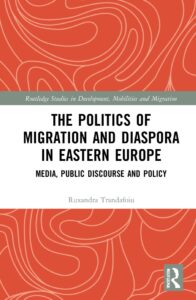
The Politics of Migration and Diaspora in Eastern Europe: Media, Public Discourse and Policy by Ruxandra Trandafoiu

The central claim of The Politics of Migration and Diaspora in Eastern Europe: Media, Public Discourse and Policy is that although public discourse, rhetoric, and other arguments articulated by leaders, mass media pundits, and policy makers have increasingly restricted the human rights and opportunities of migrants, refugees, and diasporic communities, these groups are not immobile victims of these newly expressed policies; indeed, they have mobilized their efforts to counter increasing discrimination and persecution. At a time in which illiberal democracy and competitive authoritarianism have both been on the rise, Ruxandra Trandafoiu offers a compelling understanding of the ways in which the human rights of migrants and refugees have eroded in the nascent democracies of Eastern Europe. To help her demonstration, she addresses the increase in the number of diasporic returns to origin countries and the creation and expansion of diasporic political rights at the start of the third decade of 2000s.
Notwithstanding her oft-stated skepticism of Western social science methodologies, concepts, and comparisons, Trandafoiu emphasizes how different regimes in various regions of Eastern Europe—from Poland and Hungary to Tajikistan, Kazakhstan, and Kyrgyzstan in Central Asia—have used the migration issue to generate support for fundamentalist, illiberal, and nationalist politics and regimes. Accepting the reality of European neocolonialism but fearing the rejection of supranationalism and the rise of national particularism, she calls for institutional reforms such as those the EU has attempted with little relative success and many abject failures. As concepts such as “ethnopolitical demography” have emerged out of national identity and nationalist discourses, Trandafoiu embraces “symbolic geography” as a critical methodology to address approaches that undermine research into the multiple experiences of migrants, refugees, and diasporic individual from their own viewpoints. The book thus focuses on transnational imaginaries, diasporic politics, and the growing hostility of European leaders to the influx of both refugees and migrants to explain the various ways in which illiberal populism in Eastern Europe—the study of which has been a mature academic industry in European Studies for two decades—can be seen as an implicit or explicit cause of emigration and diasporic transnationalism. She also explains how this illiberal populism might induce members of the diaspora to participate in the political life of their home country from abroad or to return to their motherland.
Although the author’s comprehensive knowledge of the region is evident, her approach is more journalistic than scientific because more descriptive than analytical. Arguing for the primacy of rhetorical techniques and discourses to highlight the causes of migration and diasporas is surely challenging. However, the author succeeds in explaining that public discourse does frame the way Eastern European countries have shaped their migration and mobility policies. The book also makes many references to other regions, for example Western Europe, North America, Transcaucasia, and Central Asia, offering a comparative analysis that is unfortunately at times fraught with inaccuracies. For example, the author claims that censorship has been legalized through judicial appointments in Eastern and East-Central Europe, as it has been in North America. In fact, I believe the First Amendment of the US Constitution remains more liberal than any European constitution. In contrast, the freedom to lie, defame, and libel others in Eastern Europe finds echoes in the US. It is also at least debatable that—despite rhetoric that advocates harsh restrictions on in-migration—the US is more restrictive in its migration policy than the EU and Eastern Europe. For example, US courts have outlawed policies that resulted in children being separated from their parents and awarded impressive reparations to the victims of these policies. On the contrary, in the EU, migration and asylum have been marked by a systematic disregard for the rule of law.
Additionally, the author claims that East European, Western European, or American populists are motivated by neocolonial motives and dynamics. While that may be true of populists in Hungary and Russia, and perhaps also in Greater Romania, for me, Nigel Farage, Marine Le Pen, Donald Trump, Alexis Tsipras, Giorgia Meloni, or Geert Wilders lack any neo-imperial ambitions. Moreover, such ambitions can be exhibited also by non-populists, such as Vladimir Putin. Although populism, particularly its Christian-nationalist, autocratic version, may remain both robust and a primary discourse dominator in Eastern Europe, hostility toward migration may also reflect the contemporary public opinion about job preservation, high unemployment, and inflation rates, all of which are inherent to moderate politics. In fact, the kin-minority, transnational imaginary does not appear to be particularly unique to Eastern Europe. Certainly, in the US, many non-American residents and dual citizens can and do vote in their home countries’ elections. Diasporic politics has a long history in Europe, where large communities can not only influence foreign policies in the state they live in but also organize campaigns around issues that matter in their home countries. For example, the diasporic vote in Romania’s 2014 and 2019 presidential elections was decisive for the victory of an ethnic German—Klaus Iohannis—and made for a less illiberal environment in Romania.
Finally, discourse alone is not sufficient to explain migration and diasporic politics in Eastern Europe. Moreover, while this book constitutes a readable and compelling description of the region’s migration politics, it lacks a proper engagement with the role of security and intelligence bureaucracies in the politics of migration. Just as Latin American armed forces have been critical in the democratic transition or decay there, in post-socialist countries, former security services—which learned their trade under the Russian mentorship for disinformation, misinformation, conspiracy theories, and propaganda—have played a major role. Moreover, the Russian FSB, successor to the KGB, has pursued its own interests throughout the region. Thus, the author has made an important contribution for a better understanding of migration politics in the region, but her description lacks an engagement with some of the sources of this politics.
Henry (Chip) Carey has been a professor of political science at Georgia State University since 1998. He is the co-author, most recently, of Legalization of International Law and Politics: Multi-Level Governance of Human Rights and Aggression (Palgrave 2023). He is currently chair of the International Law Section of the International Studies Association and is on the Council of the Asylum Representation section of the Latin American Studies Association.
The Politics of Migration and Diaspora in Eastern Europe: Media, Public Discourse and Policy
By Ruxandra Trandafoiu
Publisher: Routledge
Hardcover / 174 pages / 2022
ISBN: 978-0-367-51797-7
Published on April 15, 2024.




